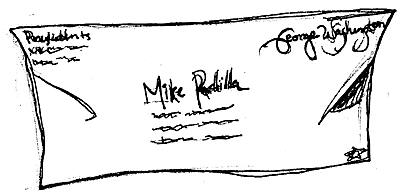
Illustration by Mike Padilla
|
|
Arizona Daily Wildcat
Wednesday, April 6, 2005
Print this
Of Texas' 254 counties, 79 are still dry, seven decades after the repeal of Prohibition. Many of the remaining counties are "moist" or partially dry. Some permit one form of alcoholic beverage but not another, some prohibit on-premise consumption (except for private clubs) and some permit on-premise but no off-premise consumption.
William Sokolin paid $519,750 for a bottle of 1787 vintage wine which supposedly had been owned by Thomas Jefferson. Sokolin later knocked it over accidentally, breaking the bottle and spilling the precious contents on the floor.
During the San Francisco Gold Rush, many '49ers paid $1, $5 and even $100 for a glass of water. However, bacon could be had for a penny a pound. Those who had excess bacon often considered it worthless and dumped it by the side of the road. One emigrant reported seeing 10 tons in one pile.
In 1391 A.D., the Bureau of Imperial Supplies produced 720,000 sheets of toilet paper a year, each sheet measuring 2 feet by 3 feet - for use by the emperor only.
In 1857, New Yorker Joseph C. Gayetty produced the first packaged bathroom tissue in the United States. Called "The Therapeutic Paper," it contained an abundance of aloe, a curative addition. It was sold in packs of 500 sheets for 50 cents and Joseph Gayetty had his name printed on each sheet.
More than $6 billion in gold is stored underground at Fort Knox. This is the largest amount of gold stored anywhere in the world.
At one time, all American presidents, their wives and important political figures were exempt from having to pay postage. All they had to do was sign their name in the corner of the envelope, a practice that became known as "franking." Today many valuable autographs sold to collectors are taken from these franked envelopes.
Write a Letter to the Editor
|
